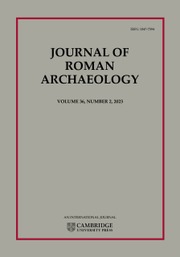Article contents
A new bath complex in Late Roman Dyrrachium (Albania)
Published online by Cambridge University Press: 26 July 2021
Abstract
This note considers a Late Roman bath building recently discovered in Durrës, Albania (ancient Dyrrachium), near the presumed Roman city center. This discovery is particularly interesting given our limited knowledge of the urban layout and of bathhouses during this important phase of the city. Despite the limited scope of the excavations, the layout of the complex, as well as certain architectural characteristics, suggests the use of design principles based on Imperial baths. The exclusive use of bricks is significant for this area in Late Antiquity. The imposing monumentality of the structures is comparable to baths in cities with Imperial authority. In the absence of stratified layers linked to this structure, moldmade marks on the bricks and decorative features from the marble facing provide a chronological window between the last quarter of the 4th c. and around the middle of the 5th c. CE for its construction.
- Type
- Note
- Information
- Copyright
- Copyright © The Author(s), 2021. Published by Cambridge University Press
References
- 1
- Cited by


